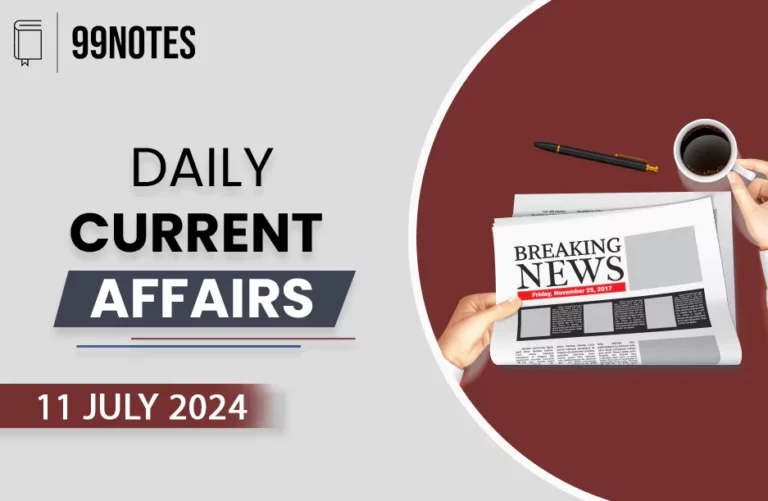6 October 2023 : Daily Current Affair
Daily Current Affairs
6-October-2023
1. Norway’s Jon Fosse wins Nobel for literature.
Topic: GS1 – International awards
Context:
- Jon Fosse, a 64-year-old Norwegian playwright, has been awarded the Nobel Prize in Literature.
Additional information on this news:
- The Swedish Academy honored him “for his innovative plays and prose that give voice to the unsayable.”
- Fosse’s body of work includes plays, novels, poetry collections, essays, children’s books, and translations, with notable works like “Boathouse” and “Melancholy I and II.”
- Fosse expressed his gratitude for the award, emphasizing the importance of literature for its own sake.
- The Nobel committee praised Fosse’s ability to convey the feeling of disorientation, leading to a deeper experience akin to divinity.
- Fosse’s plays have been translated into approximately 50 languages.
2. Pollution takes a front seat as stubble fires spike in Punjab
Topic: GS3 – environmental pollution.
Context:
- As the paddy harvest season progresses in Punjab, the issue of stubble burning, a major contributor to air pollution, is resurfacing.
- Punjab has witnessed 656 farm fire incidents during the ongoing Kharif season, marking a 63% increase compared to the same period last year.
- Data from the Punjab Pollution Control Board, based on satellite imagery, reveals a significant rise in farm fire incidents compared to the previous year.
Stubble burning as a contributor to air pollution:
- Stubble burning is a common agricultural practice involving the deliberate burning of crop residues after harvest.
- It is a significant contributor to air pollution, releasing harmful pollutants and particulate matter into the atmosphere.
- The burning of stubble emits pollutants such as carbon dioxide (CO2), carbon monoxide (CO), sulfur dioxide (SO2), nitrogen oxides (NOx), and particulate matter (PM2.5 and PM10).
- These pollutants have adverse health effects, including respiratory problems, cardiovascular diseases, and reduced lung function, particularly in areas where stubble burning is prevalent.
- Stubble burning is a major concern in regions like northern India, including Delhi and its surrounding areas, where it worsens air quality during the post-harvest season.
Why farmers resort to stubble burning?
- Time Constraints: Stubble burning allows farmers to quickly clear fields after the harvest to prepare for the next crop, saving time and labor.
- Cost-Effective: Burning is a cost-effective method as it eliminates the need for expensive machinery or labor to remove crop residues.
- Lack of Alternatives: In some regions, farmers perceive a lack of viable alternatives for crop residue management, such as mulching or using specialized machinery.
- Monetary Pressure: Farmers facing financial constraints may opt for stubble burning to reduce expenses and maximize their limited resources.
- Perceived Benefits: Farmers may believe that burning helps control pests and diseases and improves soil health, although these benefits are often short-lived.
- Market Demands: The demand for early sowing of the next crop can drive farmers to burn stubble to expedite field preparation.
Way forward:
- Awareness and Education: Launch comprehensive awareness campaigns to educate farmers about the harmful effects of stubble burning and the benefits of alternative crop residue management methods.
- Subsidies and Incentives: Provide financial incentives and subsidies to encourage farmers to adopt eco-friendly technologies and equipment for crop residue management.
- Research and Development: Invest in research and development to create cost-effective and efficient machinery and techniques for crop residue management.
- Community Initiatives: Promote community-based initiatives where farmers collectively adopt sustainable practices, share resources, and support each other in adopting eco-friendly methods.
- Policy Support: Implement and enforce policies and regulations that discourage stubble burning and encourage sustainable agricultural practices.
- Crop Diversification: Encourage crop diversification to reduce the need for immediate field preparation after the harvest of paddy, which is a major contributor to stubble burning.
- Government-Industry Collaboration: Collaborate with the private sector to develop and promote technologies that can convert crop residues into valuable products, such as biofuels or compost.
Question: What are the key strategies and policies that can be adopted to address the issue of stubble burning in agriculture and promote sustainable crop residue management in India?
3. No country for old woman.
Topic: GS1 – Indian society
Some important statistics:
- The share of elderly population is expected to be doubled to 20.5% by 2050.
- It is expected that senior women will outnumber senior men.
- About 30% of senior women have one morbidity and 25% women suffer from two morbidity.
Who is faced by elderly woman in India:
- Financial Dependence: Many elderly women rely on their families for financial support, making them susceptible to economic exploitation.
- Social Isolation: Isolation and loneliness are common among elderly women, as they often lack social connections and companionship.
- Health Issues: Elderly women may have limited access to healthcare services, leading to unaddressed health issues and reduced quality of life.
- Abuse and Neglect: Cases of elder abuse and neglect, including physical, emotional, and financial abuse, are reported among elderly women.
- Property Rights: Inheritance and property rights issues can leave elderly women without access to their rightful assets.
- Limited Pension Coverage: Many elderly women do not have access to pension schemes or financial security in their old age.
- Gender-Based Discrimination: Gender-based discrimination persists, affecting the status and well-being of elderly women.
Possible policy solutions:
- Social Security Programs: Expand and strengthen social security programs, such as pensions and old-age benefits, to provide financial support to elderly women.
- Healthcare Access: Ensure accessible and affordable healthcare services for elderly women, including regular health check-ups and geriatric care.
- Awareness and Education: Conduct awareness campaigns and educational programs to inform elderly women about their rights, health, and available support services.
- Legal Protections: Enforce and strengthen laws that protect the property and inheritance rights of elderly women, preventing property disputes and discrimination.
- Elderly Helplines: Establish helplines and support centers specifically for elderly women to report abuse, seek assistance, and access legal aid.
- Community Engagement: Promote community-based initiatives and support groups to reduce social isolation and provide a sense of belonging.
- Empowerment Programs: Develop skill-building and income-generation programs to empower elderly women economically and socially.
- Gender Sensitization: Conduct gender sensitization programs targeting society and institutions to reduce gender-based discrimination against elderly women.
- Inter-generational Activities: Encourage inter-generational activities to foster positive relationships between elderly women and their families.
Question: What policy measures can be implemented to address the unique challenges faced by elderly women in India, and how can these measures promote their well-being and empowerment?
4. India looking to engage with the new Maldives govt. on all issues, says MEA
Topic: GS2 – international relations
Context:
- The Maldives President-elect, Mohamed Muizzu, expressed a desire to ask Indian military personnel to leave the islands following his electoral victory.
- India’s Ministry of External Affairs (MEA) responded by stating that India looks forward to engaging the new Maldivian government on all issues.
Potential areas of cooperation between of India – Maldives relations:
- Geopolitical Location: The Maldives, strategically located in the Indian Ocean, is of great significance to India’s maritime interests and security.
- Maritime Cooperation: Both countries collaborate on maritime security, including anti-piracy efforts, ensuring the safety of sea lanes, and combating transnational crimes.
- Economic Ties: Economic cooperation, including trade and investment, plays a vital role in the relationship, benefiting both nations.
- Climate Change: The Maldives and India share concerns about climate change and its impact on low-lying coastal areas, leading to cooperation on climate adaptation and resilience.
- People-to-People Ties: Strong cultural and people-to-people ties contribute to the depth of the relationship.
- Defense and Security: India provides defense assistance to the Maldives, including naval and aerial support, reinforcing security cooperation.
- Regional Stability: Cooperation between the two nations contributes to regional stability in the Indian Ocean region.
Challenges to India – Maldives relations:
- China’s growing influence in the Maldives:China has been investing heavily in the Maldives in recent years, including in infrastructure, tourism, and defense. This has raised concerns in India, which sees China as a strategic rival in the region.
- Political instability in the Maldives:The Maldives has experienced a period of political instability in recent years, with multiple changes in government. This has made it difficult for India to maintain close relations with the Maldivian government.
- Islamic radicalization in the Maldives: There has been a rise in Islamic radicalization in the Maldives in recent years. This has led to concerns in India about the possibility of terrorist attacks in the Maldives and other parts of the region.
- Maritime security issues: There have been some disagreements between the two countries on maritime security issues, such as the delimitation of their maritime boundaries.
- Sovereignty Concerns: The “India Out” plank in Maldives’ politics, as seen in the 2023 election, raises concerns about sovereignty and the presence of Indian military personnel in the country.
Question: Discuss the challenges and opportunities in India-Maldives relations. Also, analyze the significance of regional stability in the Indian Ocean region in the context of this relationship.
5. India expanding censorship regime, creating uneven playing field: study
Topic: GS2 – Press censorship
Context:
- Global Internet freedom has declined for the 13th consecutive year, according to a report by Freedom House.
More Information on this news:
- The report, titled “Freedom on the Net 2023: The Repressive Power of Artificial Intelligence,” highlights the growing use of artificial intelligence by governments for censorship and the spread of disinformation.
- Iran saw a sharp rise in digital repression, including Internet shutdowns, during anti-government protests.
- China remains the world’s worst environment for Internet freedom for the ninth consecutive year, with Myanmar being the second most repressive.
- In India, the government, has incorporated censorship, including AI-based moderation tools, into the legal framework.
- India has engaged in various censorship methods, including Internet connectivity restrictions, blocking social media platforms and websites, and forced removal of content.
The need for internet freedom:
- Internet freedom is essential for protecting human rights and free expression in the digital age.
- It enables access to information, fosters innovation, and facilitates democratic participation.
- Internet freedom is critical for holding governments and institutions accountable and promoting transparency.
- Restrictions on internet freedom can lead to censorship, surveillance, and the suppression of dissent.
- It plays a vital role in promoting global connectivity and economic growth.
- Protecting internet freedom is crucial for ensuring a fair and open digital landscape.
Why governments choose to regulate internet:
- Governments may regulate the internet to maintain control over information flow and suppress dissent.
- National security concerns may lead governments to monitor and restrict online activities.
- Regulation may be driven by a desire to combat cybercrime, protect intellectual property, or address online harassment and hate speech.
- Some governments seek to uphold cultural or moral values by regulating online content.
- Economic interests can also play a role, as governments may aim to protect domestic industries or collect revenue through internet taxation.
- Governments may regulate the internet to maintain social stability or address issues such as fake news and disinformation.
- Political considerations, including electoral manipulation, can lead to internet regulation during election periods.
- Concerns about extremism, terrorism, or foreign influence may prompt government intervention online.
Solution: the middle path
- A balanced approach to internet regulation, respecting both freedom of expression and security concerns.
- Promoting transparency in regulatory measures to avoid undue censorship.
- International cooperation and agreements to address cross-border internet issues.
- Encouraging self-regulation and responsibility among internet service providers and social media platforms.
- Promoting digital literacy and media literacy to help users critically evaluate online content.
- Empowering civil society and independent media to hold governments accountable for internet regulations.
- Establishing clear and proportionate legal frameworks for addressing online threats.
- Encouraging multi-stakeholder dialogues to involve various stakeholders in the regulatory process.
- Regular reviews and revisions of internet regulations to adapt to changing technology and societal needs.
Question: Discuss the challenges and potential solutions for governments in regulating the internet while upholding principles of freedom of expression and security.
6. Nagorno-Karabakh conflict and India
Topic: GS2-IR
Context:
- The Conflict between Armenia and Azerbaijan over Nagorno-Karabakh is called one of the “frozen conflicts” of the world.
- This conflict erupted on September 19, when Azerbaijan launched an offensive and within 24 hours, declared victory over the separatist province of Nagorno-Karabakh.
- Though far away, the recent developments in the South Caucasus region have implications for India.
Strategic importance of the region:
- The Caucasus, which is the area between the Black Sea and the Caspian Sea, is where several gas and oil pipelines from the energy-rich Azerbaijan have been erected in order to reach Turkey and Europe.
- Some of these pipes travel within 16 kilometres of the border, which is close to the area of conflict.
- The pipelines might be attacked in an open conflict between the two nations, which would have an effect on energy supply and could increase oil prices on a global scale.
Role of India: Challenges & Interests
Asymmetry in Relations
- With Armenia, India has a friendship and cooperation pact (signed in 1995) that, incidentally, forbids India from giving Azerbaijan any kind of support, be it military or otherwise.
- In the example of Azerbaijan, ONGC/OVL invested in an oilfield project there, and GAIL is investigating the potential for LNG collaboration.
- Azerbaijan is also a part of the International North South Transport Corridor (INSTC), which runs through Central Asia and links Russia with India.
- Through the passenger and freight rail link between Baku, Tbilisi, and Kars, it can also connect India with Turkey and other countries.
- Armenia expresses its unwavering support for India in the Kashmir conflict, in contrast to Azerbaijan, which not only opposes but actively supports Pakistan’s position.
- In contrast to “Neighbourhood First,” “Act East,” or “Central Asia Connect,” India does not have a publicly stated policy for the South Caucasus.
- The area has continued to be only a small part of its foreign policy priorities.
Keeping the Two Extremes in Balance
- The war is primarily a struggle between two international principles: the right to self-determination asserted by Nagorno-Karabakh and supported by Armenia, and the principle of territorial integrity defended by Azerbaijan.
- Given that Azerbaijan has showed little concern for India’s territorial integrity, which Pakistan breached in Jammu and Kashmir, India has every cause to oppose Azerbaijan’s territorial integrity.
- At the same time, it is challenging for India to publicly support Nagorno-Karabakh’s right to self-determination due to the potential negative effects it may have on India, as its enemies like Pakistan may abuse it by falsely linking it to Kashmir and by reigniting secessionist movements in some regions of India.
7. IN NAME OF TELANGANA’S NEW VARSITY, THE LEGEND OF SAMMAKKA-SARAKKA
Topic: GS1-Culture
Context:
- The Union cabinet approved a tribal university for Telangana– the Sarakka Central Tribal University, which will comeup in Mulugu district at a cost of Rs 889 crore.
- Prime Minister Narendra Modi announced that the university would be named after Sammakka Sarakka —a mother-daughter duo revered by the local tribal community.
About Sammakka-Sarakka
- Sammakka is said to have been married to Pagididda Raju, a feudal chief of the Kakatiyas, a dynasty which ruled the Warangal area. She had two daughters and one son — Sarakka or Saralamma, Nagulamma and Jampanna, respectively.
- In the 13th century, during a battle to protest taxes imposed on the Koya people, Saralamma died. Sammakka disappeared into the hills and local tribals believed she metamorphosed into a vermillion casket.
- To commemorate the mother-daughter, Mulugu holds a biennial festival—the Sammakka Saralamma Jatara considered among the largest gatherings of tribal people in the world.
- The Jatara or pilgrimage begins at Medaram village and the rituals are conducted by Koya priests.
About Medaram Jatara or Sammakka Saralamma Jathara:
- It is a tribal festival of honouring the goddesses celebrated in the state of Telangana, India.
- About:It is the second-largest fair of India, after the Kumbh Mela.
- Celebrated by: The second-largest Tribal Community of Telangana- the Koya tribefor four days.
- It is biennially celebratedin the month of “Magha” (February) on the full moon day and organized by the Koyas in collaboration with the Tribal Welfare Department, Government of Telangana.
- State festival: Considering the footfall of the festival and its auspicious significance, the Jathara was declared a State Festival in 1996.
- It is conducted in honour of the Goddesses Sammakka and Saralamma.
- Medaram is a remote place in the Eturnagaram Wildlife Sanctuary, a part of Dandakaranya, the largest surviving forest belt in the Mulugu.
8. Odisha’s backward classes number out
Topic: Society
Context:
- A Recent survey conducted by the Odisha government puts the number of Socially and Educationally Backward Classes (SEBCs), or Other Backward Classes (OBCs) in the state at 39.31%.
Details:
- As per the survey’s findings, conducted by the Odisha State Commission for Backward Classes (OSCBC), 53,96,132 households comprising 1,94,88,671 people belong to the SEBC category.
- The 2011 Census places Odisha’s population at 4.19 crore.
- As per the OSCBC’s projections, it will be 4.95 crore in 2023.
- As many as 11 districts — Ganjam, Puri, Nayagarh, Kendrapada, Jagatsinghpur, Bhadrak, Dhenkanal, Balangir, Boudh, Sonepur and Nuapada have been identified as “very highly” SEBC-populated, with the community’s population here exceeding 45% of the total population.
- Other districts such as Khurda, Balasore, Angul, Cuttack, Jajpur, Deogarh, Bargarh, and Kalahandi have been classified as highly SEBC populated districts, with their numbers between 30% to 45%.
- While the findings have not been made official yet, sources said 6% of those belonging to the SEBC category do not have more than primary-level education, with only 3% of them having government jobs.
For Enquiry

6 October 2023 : Daily Current Affair

6 October 2023 : The Hindu Editorial Notes PDF

5 Oct 2023 : Daily Quiz

5 Oct 2023 : Daily Answer Writing

5 Oct 2023 : Indian Express

5 Oct 2023 : PIB

5 October 2023 : Daily Current Affair

5 October 2023 : The Hindu Editorial Notes PDF

Directive Principles of the State Policy (DPSPs)

4 Oct 2023 : Daily Quiz
Daily Current Affairs 6 October 2023 : Daily Current Affair Daily Current Affairs
6-October-2023
1. Norway’s Jon Fosse wins Nobel for literature.
Topic: GS1 –…
October 2023 The Hindu 6 October 2023 : The Hindu Editorial Notes PDF The Hindu Editorial
6-October-2023
1. National unity, a three-dimensional view.
Topic: GS1 –…
Daily Quiz 5 Oct 2023 : Daily Quiz 5 Oct 2023 : Daily Quiz…
mains answer writing 5 Oct 2023 : Daily Answer Writing Mains Answer Writing
5-october-2023
Q1) The first step to eradicating poverty is reliable poverty assessment…
Indian Express 5 Oct 2023 : Indian Express Indian Express
5-October-2023
1) Cauvery Water Dispute
Context:
The Cauvery Dispute has flared up…
October 2023 PIB 5 Oct 2023 : PIB PRESS INFORMATION BUREAU
5-Oct -2023
1. Cabinet approved Amendment to the Central Universities Act,…
Daily Current Affairs 5 October 2023 : Daily Current Affair Daily Current Affairs
5-October-2023
1. Seven dead as glacial lake bursts in Sikkim.
Topic: GS3 –…
October 2023 The Hindu 5 October 2023 : The Hindu Editorial Notes PDF The Hindu Editorial
5-October-2023
1. Retribution for the south, accolade for the north.
Topic: GS2…
Polity Directive Principles of the State Policy (DPSPs) Part IV (Articles 36 to 51) of the Constitution constitutes the Directive Principles of State Policy(DPSPs)….
Daily Quiz 4 Oct 2023 : Daily Quiz 4 Oct 2023 : Daily Quiz…





